How much gold does it cost to buy a home in Britain?
Our debased paper money is increasingly unable to measure the real value of anything. So how can we arrive at the true price of property in Britain? By using gold, says Dominic Frisby. Here, he looks at where Britain's housing market really stands.
Get the latest financial news, insights and expert analysis from our award-winning MoneyWeek team, to help you understand what really matters when it comes to your finances.
You are now subscribed
Your newsletter sign-up was successful
Want to add more newsletters?

Twice daily
MoneyWeek
Get the latest financial news, insights and expert analysis from our award-winning MoneyWeek team, to help you understand what really matters when it comes to your finances.

Four times a week
Look After My Bills
Sign up to our free money-saving newsletter, filled with the latest news and expert advice to help you find the best tips and deals for managing your bills. Start saving today!
As I mentioned last week, I may be buying a new house and I may have to sell some of my gold to do so.
I don't particularly want to, but needs must.
So today I am going to take a look at one of my favourite subjects - house prices, as measured in gold.
MoneyWeek
Subscribe to MoneyWeek today and get your first six magazine issues absolutely FREE

Sign up to Money Morning
Don't miss the latest investment and personal finances news, market analysis, plus money-saving tips with our free twice-daily newsletter
Don't miss the latest investment and personal finances news, market analysis, plus money-saving tips with our free twice-daily newsletter
Why measure house prices in gold?
Every time I return to this topic, comments pop up questioning the validity of the exercise. You can't buy houses with gold, runs the argument, so what's the point of looking at the ratio of the two?
First, there are many who have wisely moved their wealth into gold to see out the current financial storm. They will move out of gold when they see relative value elsewhere. Hence the need to compare the price of gold to other markets.
Second, we are living in an age where money is being systematically, deliberately debased. This is not a conspiracy theory. The Bank of England is ignoring its stated duty, which is to keep inflation at 2%. Instead, it is issuing money out of nowhere and using it to buy bonds, in order to suppress long-term interest rates and 'kick-start' the economy. In other words, it is actually trying to create inflation.
In the case of the housing market, it hasn't kick-started anything. In fact, it's brought the market to a standstill. Savers and first-time buyers are left waiting on the sidelines for lower prices, watching their savings get eroded by inflation and in some cases, simply unable to secure a mortgage. Meanwhile debtors bask in the saver-subsidised cheap living provided by the Bank and its artificially low interest rates. Yet the Bank goes on printing.
If you look at the price of anything over the last 50 years - houses, food, energy, Western wages (not in real terms, but nominal) - you will see that it has gone up. This is down to our system of money - the supply of which is potentially limitless.
The only items where these endlessly rising prices are less evident are in items such as computers and clothing that have benefitted from mass production, improved technology, and cheap labour in emerging markets.
I prefer not to use something that is being debased as my unit of account. I prefer something finite, which is why I like gold. New gold supply roughly matches world population growth - that makes it a much more natural form of money, or more natural unit of account at least.
Yes, you could use Mars Bars, as one poster suggested in the past. But they do not have the weight of several thousand years of monetary history; they are less finite; and the data is harder to come by. So let's stick with gold.
The massive divide between London and the rest of the UK
First we look at UK house prices measured in gold. (My thanks to Professor Tom Fischer, of the University of Wuerzburg, for the chart). (click on any of the charts to see a bigger version)
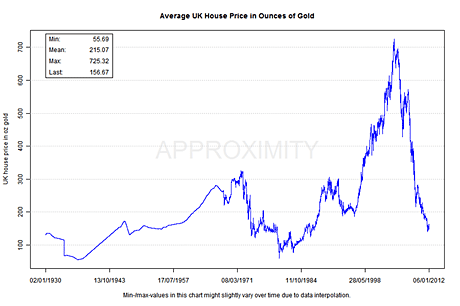
In gold terms, UK housing has fallen by just over 78% from its high of 725 ounces in 2005 to 156 ounces in January. It is below its lows of the early 1990s, but has not yet reached its lows of the early 1980s or 1930s (50-100 ounces for the average UK house) - where, by the way, I am convinced it will be in a few years' time.
We all know however, that the housing markets of London and the rest of the UK are very different beasts.
Using land registry data (which we only have going back to 1995), Nick Laird of Sharelynx (www.sharelynx.com) has kindly put together a host of charts, showing the average price of houses in various UK regions and London boroughs measured in gold - and also silver. There isn't room for all of them here, unfortunately (subscribe to his site if you want to see them all), so I will just post a sample.
Picking a region at random, here is the north-east of England. The market is depressed here, and it takes less than 100 ounces of gold to buy the average house. Gold is well below its lows of the early 90s.
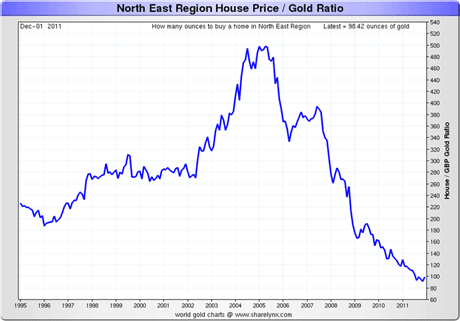
At the other end of the country, the south-west is a little stronger, but still well below the early 90s lows.
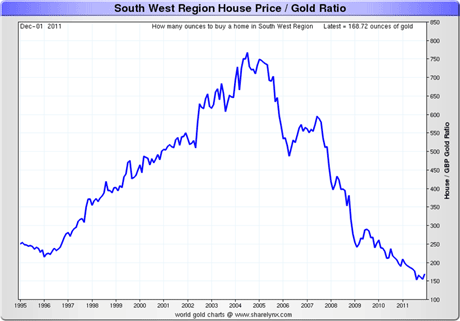
Now we look at London. Unlike the rest of the UK, which is down around 15%, London house prices have rallied back to close to the 2007 highs (certain boroughs are above them). Yet in gold terms they have actually fallen below the lows of the early 90s.
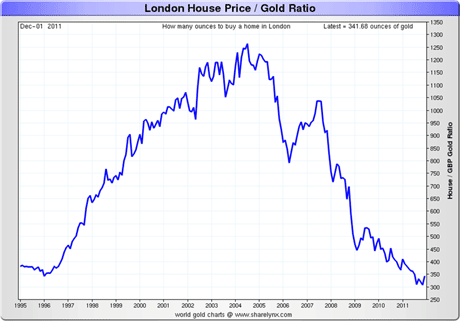
But boroughs such as Westminster and Kensington & Chelsea, which have been flooded by foreign money, are actually trading above 1995 levels, as measured in gold.
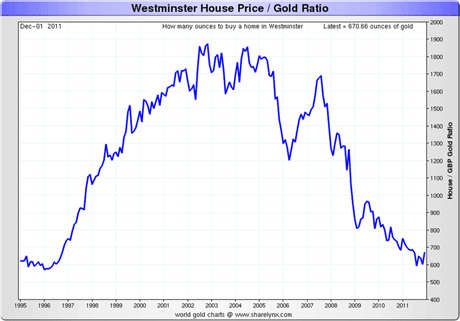
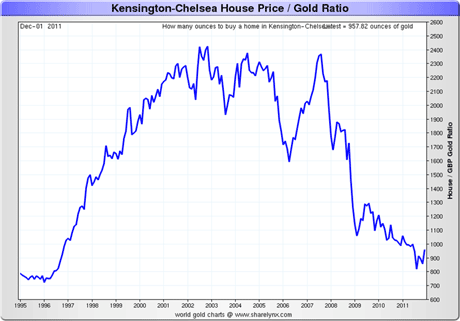
This also applies to the neighbouring 'trickle-down' boroughs, such as Wandsworth and Islington (see here for the relevant charts).
This huge gulf in performance between London's 'desirable' boroughs, which have risen, and the rest of the UK, which has fallen, exacerbates the ever-increasing rich-poor divide.
It's entirely a consequence the devaluation of the pound since 2007-8, which has made central London look cheap to overseas buyers. I thought the rich-poor divide was something policy-makers were supposed to be suppressing, not increasing.
Outside of London, I can actually see an argument for rolling out of gold and into property. It's not one that I agree with. I would wait, as I think we have further to fall. But property is no longer expensive in gold terms, as it was in, say, 2004-5.
What could bring London prices down?
But the flood of foreign money has meant that in London the falls have been less pronounced - in fact, measured in sterling there have been rises. Get out of London if you want to find value, is the simple answer. That's not possible for me.
If London property was purely a reflection of what Londoners could pay, then prices would be lower. But it isn't. What's going to stop the flood of foreign buyers for London property? A dramatic rise in the pound is one possibility. But a quick £50bn in quantitative easing has just killed that possibility, although the pound does look strong against the euro.
Another 2008-style collapse? Possible, but don't bank on it.
More likely is some change of legislation, a new tax maybe - a mansion tax, or a change in non-dom status, for example. I don't know. But, to my knowledge, there is nothing in the pipeline.
Which all brings me back to the argument of last week, which is to play the game that our glorious leaders want us to play and take on as much cheap debt as you can handle, and fix it for as long as possible as soon as you get a whiff of rising rates. It's a bet that's less about rising property prices and more a play on the continued devaluation of money - which, funnily enough, is the same bet as gold really.
If you do take on that level of debt, make sure you can comfortably service the interest, of course. And, hopefully, by the time it's finished appreciating, your gold will be worth more than enough to get rid of your mortgage.
I've had a slight reprieve from my landlord by the way - he's decided he doesn't want his place back until later in the year - so I've put off looking for the time being. But if I do eventually succumb and pay an exorbitant London price, a little piece of me will probably die inside.
This article is taken from the free investment email Money Morning. Sign up to Money Morning here .
Our recommended articles for today
What does Greece's future hold? Ask the Argentinians
As Greece teeters on the edge of a default, Matthew Partridge reflects on Argentina's financial crisis of a decade ago, and looks at the lessons to be learned for Greece - and for investors.
Britain's high street gloom was made in the City
The crisis on Britain's high streets is not a retailing crisis, it is a financial one, says Matthew Lynn. The City is stretching businesses to the point where they can no longer cope with any kind of adversity.
Get the latest financial news, insights and expert analysis from our award-winning MoneyWeek team, to help you understand what really matters when it comes to your finances.
MoneyWeek is written by a team of experienced and award-winning journalists, plus expert columnists. As well as daily digital news and features, MoneyWeek also publishes a weekly magazine, covering investing and personal finance. From share tips, pensions, gold to practical investment tips - we provide a round-up to help you make money and keep it.
-
 Should you buy an active ETF?
Should you buy an active ETF?ETFs are often mischaracterised as passive products, but they can be a convenient way to add active management to your portfolio
-
 Power up your pension before 5 April – easy ways to save before the tax year end
Power up your pension before 5 April – easy ways to save before the tax year endWith the end of the tax year looming, pension savers currently have a window to review and maximise what’s going into their retirement funds – we look at how

